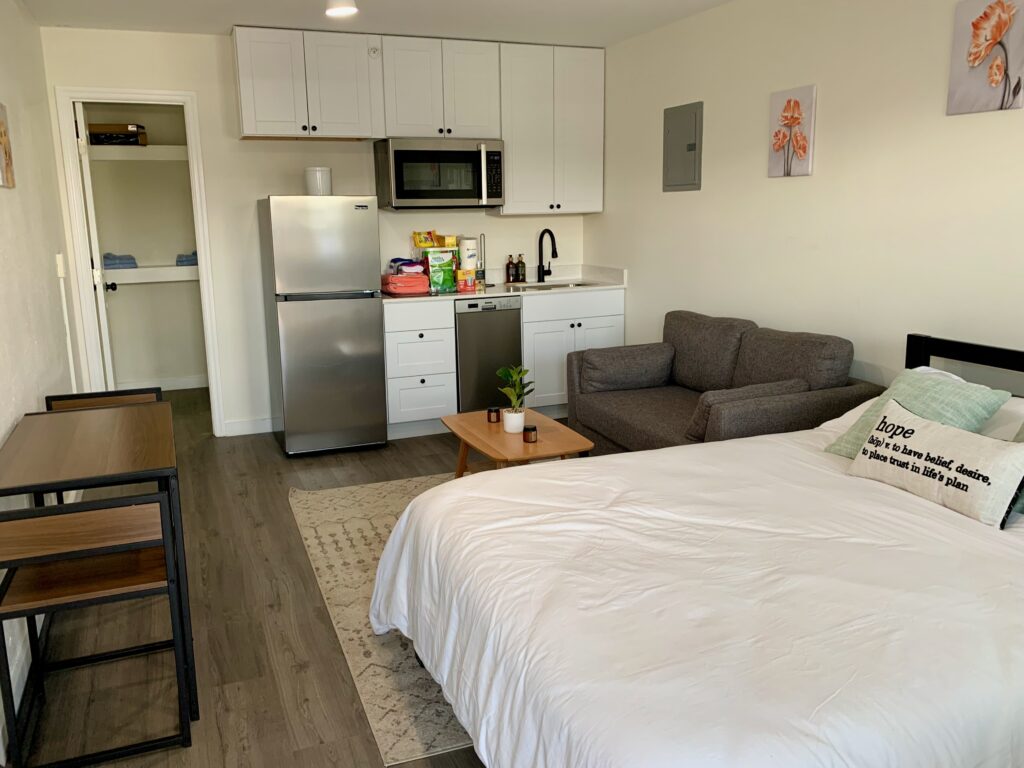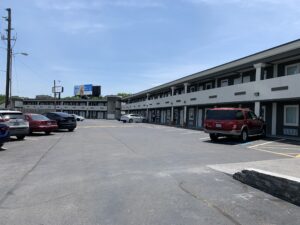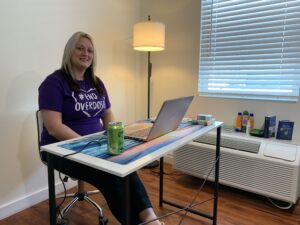
Karen Brimer lived at the Nashville Rescue mission for over two years. This spring, she used a Section 8 voucher to get her new home at the Wallace Street Studio Apartments.
Her apartment came fully-furnished and had food already in the pantry and fridge. Community partners like a mobile health clinic and a mobile food pantry come to the property a few times a month. The Wallace Street apartments are designed to help make the transition into housing for previously unhoused tenants easier.
“It took me about three days before it slipped out that, um, yeah, I’m going home. And I went… home. Wow. Really home, my own place!” Brimer said.
Developer Adam Rosenberg with AGB Real Estate managed the overhaul of a run-down motel into 132 studio units with full kitchens. He and his partners want to provide new homes and support for the people renting the apartments.
 Katherine Ceicys / WPLN News
Katherine Ceicys / WPLN News Developer Adam Rosenberg renovated a motel into studio units with full kitchens, now the Wallace Street Studio Apartments.
“We are a for profit developer. Our investors are investing in this project because not only do they get a good return on their invested capital, but they’re helping a community,” Rosenberg said.
When Rosenberg turned his attention to transitional and permanent housing solutions, he knew he had the technical know-how to transform properties. But he also realized that there was a lot he didn’t know.
So he reached out to Ryan Samuels, an old friend who works in affordable housing in Washington, D.C.
“I’ve seen it many times in Washington, D.C. Where a developer says, ‘Oh, I’ve got this property. I’m just gonna, you know, do Section 8 housing or take folks that have housing choice vouchers.’ But they don’t put in place the extra services, the scaffolding. They just throw folks in without extra help. And that’s really, in my opinion, the hard part,” Samuels said.
Samuels and Rosenberg talked through navigating the legal requirements and additional tenant approval process that come with accepting housing vouchers. For example, the property is legally required to set the rent to meet the 2024 Fair Market Rent for studio apartments in Davidson County, which is just over fourteen hundred dollars.
Samuels and Rosenberg also discussed what it could look like for a developer to help create a support system for tenants who might be coming from a shelter or living in a camp. Rosenberg hired a consultant familiar with local nonprofits and started attending community meetings. At a Homeless Planning Council meeting in January, he met Alex Smith.
“And I kind of just asked him, did he have any peer support program or anything available? And he said that he would love to talk to me about it,” said Smith.
Rosenberg soon asked Smith to help design a peer-support program.
“I was homeless for 10 years. So for me, this is very personal,” said Smith. “And honestly, I was sick and tired of hearing of people moving in one month and then dying two months later because nobody checked on them. So this will be a peer support program that will check on everyone.”
The Wallace Street property hired two Certified Peer Support Recovery Specialists who are on site and act like college Resident Assistants (RAs), but with personal experience navigating city, state and recovery resources.
“Being someone who needed that peer support at one time and seeing it and actually experiencing it on my own, like, I just knew that that was something I wanted to do, was help other people,” Wallace Street peer support specialist Leslie Henderson said.
 Katherine Ceicys/WPLN News
Katherine Ceicys/WPLN News Peer support recovery specialist Leslie Henderson works on-site at the Wallace Street Studio apartments.
Henderson applied and was accepted into the Tennessee State Department of Mental Health and Substance Abuse Services peer support recovery certification program. The program provides over 40 hours of training, including scenario-based role playing, followed by supervised field work.
Henderson has helped Wallace Street residents with everything from job applications, to finding medical care, to getting bus passes.
While her main-floor office door is often closed, that doesn’t get in the way of her connecting with residents.
“ They knock on it quite a bit, just come in and check in with me, say ‘hi.’ But I also like to walk around too and I talk to them as I’m out walking,” said Henderson. “If I know someone’s been struggling with something, I’ll go to their rooms and knock on the door if I ain’t seen them and just talk to them and just let them know, ‘Hey, I’m here.’ ”
For her part, Karen Brimer has settled into her new apartment. She’s eager to say that she is grateful for the extra support around her.
But with no income and a physical disability, she says she still struggles to meet her needs.
“The hoops you have to jump through to get something as simple as food, as toilet paper… the hoops you have to jump through to be able to get that. It’s ridiculous. It’s and it’s so degrading,” says Brimer.
For now, Brimer asks friends or panhandles to come up with the $150 a month she needs to cover her medication and the minimum rent payment required by her voucher.

